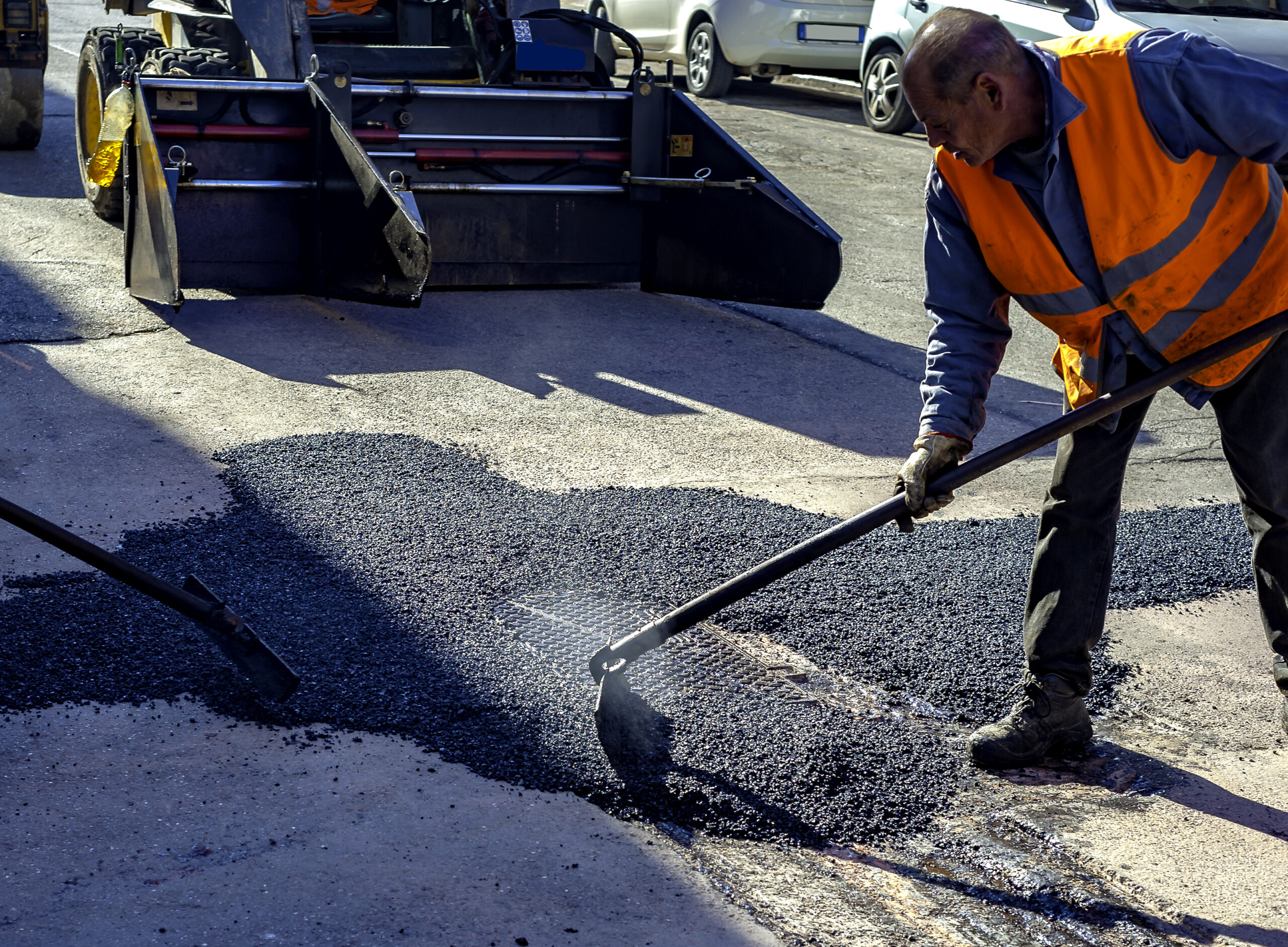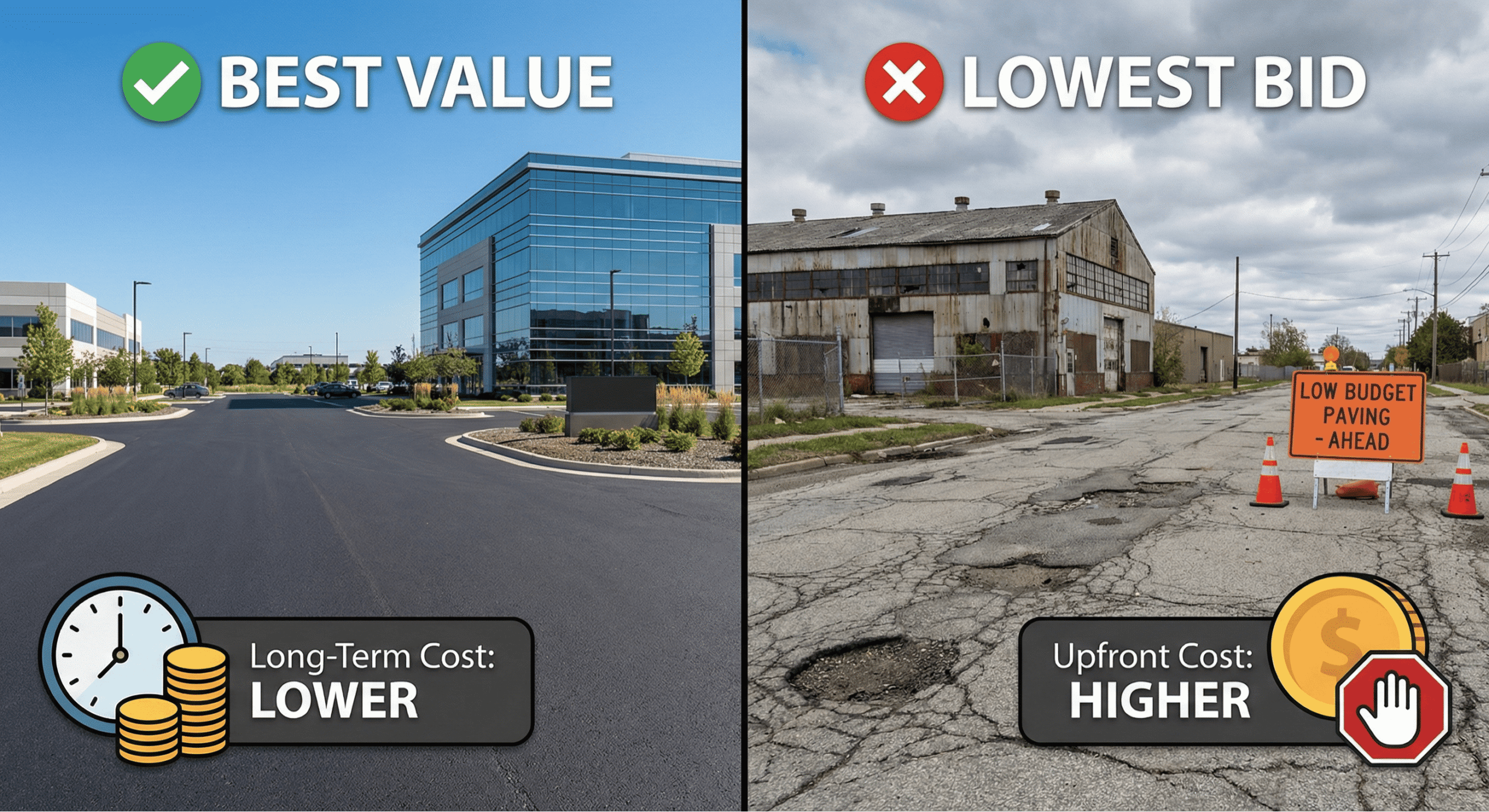
The best time to pave a commercial driveway plays a critical role in its overall success. In regions like Colorado, late spring through early fall typically provides the most suitable conditions—stable temperatures, low precipitation, and extended daylight hours. These factors support proper asphalt compaction and curing, which are essential for long-term durability. Paving during these optimal windows reduces the risk of weather-related complications, such as how weather and temperature impact asphalt paving quality. Understanding how temperature, moisture, and seasonal cycles affect asphalt helps ensure better performance, fewer repairs, and a longer-lasting surface.
Why Timing Matters for Commercial Driveway Paving
The timing of a paving project directly influences the quality, durability, and efficiency of the job. Here’s how:
Impact on Material Performance
Asphalt requires specific temperature ranges to cure properly. If it’s too cold, the asphalt won’t compact correctly, leading to weak spots and premature cracking. Warmer temperatures allow for better binding of aggregates and more uniform compaction, ensuring structural integrity.
Crew Efficiency and Project Duration
Weather conditions impact how quickly crews can complete paving. Favorable weather reduces downtime, improves safety, and ensures the materials behave as expected. Crews work more efficiently during temperate months, translating into faster turnaround times and fewer disruptions.
Cost Savings and Scheduling
Material prices and labor availability fluctuate with demand. Scheduling your paving during shoulder seasons (late spring or early fall) may offer cost advantages due to reduced competition for contractors, which can also mean better attention to your specific needs.
Best Seasons for Commercial Paving Projects
In Colorado, seasonal shifts are pronounced, and each season brings unique considerations. Here’s when to pave and why.
Spring: A Good Rebound from Winter Damage
After the snow melts and the ground thaws, spring is an ideal time to address winter damage. It’s also a great opportunity to inspect for cracks, potholes, or erosion caused by freeze-thaw cycles.
Benefits:
- Ground is easier to grade and prep
- Paving companies have more availability
- Prevents further damage through the rest of the year
Summer: Optimal Conditions for Asphalt Application

Summer offers the best combination of temperature and dry weather, allowing for superior asphalt performance.
Benefits:
- Consistent high temperatures ideal for hot mix asphalt
- Faster curing and project completion
- Lower risk of rain interference
Early Fall: A Strategic Window Before Cold Sets In
Early fall combines moderate temperatures with lower humidity, making it another excellent time for commercial paving. It also allows businesses to prepare lots before the onset of winter.
Benefits:
- Mild conditions improve compaction
- Allows time for curing before freeze-thaw cycles
- Ideal for scheduling maintenance closures
Seasons to Avoid (and Why)
While some paving can occur year-round, certain seasons should generally be avoided unless necessary repairs are urgent.
Winter: Risks of Cracking and Poor Adhesion
Cold weather below 50°F interferes with asphalt binding, increasing the risk of raveling and premature cracking.
Late Fall: Unpredictable Temperatures and Rain
Cool, damp conditions in late fall can delay curing and create surface inconsistencies, compromising the integrity of the pavement.
Climate Considerations in Colorado
Colorado’s unique climate plays a crucial role in determining ideal paving windows.
How Colorado’s Freeze-Thaw Cycles Impact Asphalt
The frequent freeze-thaw cycles cause water within the pavement to expand and contract, which stresses the surface and leads to cracking. Proper installation during optimal weather reduces these vulnerabilities.
Regional Precipitation and Temperature Trends
With average high temperatures ranging from the 70s to 90s in summer and frequent rain in May and October, timing projects around these fluctuations helps ensure better results.
| Season | Avg. Temp (°F) | Rainfall Impact | Paving Suitability |
| Spring | 50–70 | Moderate | Good |
| Summer | 70–90 | Low | Excellent |
| Early Fall | 60–75 | Low | Very Good |
| Late Fall | 40–60 | High | Risky |
| Winter | Below 50 | Variable | Poor |
Key Asphalt Curing Factors to Understand
Proper asphalt repair is essential to the strength, flexibility, and longevity of your paved surface. Several environmental factors must align to allow the material to harden correctly and resist future damage, as explained in how long does an asphalt repair last.
Ideal Surface and Air Temperatures
To achieve optimal curing, the air and surface temperatures should remain above 50°F during and for at least 24 hours following the paving process. Fluctuations outside this range can weaken the asphalt’s structural integrity.
Required Time for Proper Curing
While asphalt cools quickly and can often be driven on within 24–48 hours, full curing can take 6 to 12 months. During this period, the surface continues to harden and should be protected from heavy loads and oil spills.
How Moisture Affects Your Paving Project
Moisture is one of the most critical variables that can compromise the success of a paving project. When present during installation, it interferes with compaction and weakens the bond between asphalt layers.
Rain and Surface Dampness
Moisture can prevent asphalt from binding properly, especially during the compaction phase. Even light rain can interfere with the mix’s consistency, causing imperfections and premature wear.
Drainage Design for Longevity
Proper drainage must be integrated into the project’s design. Without appropriate slope and runoff planning, water can infiltrate the pavement’s base layers, leading to potholes and structural failure over time.
Choosing the Right Paving Material and Thickness

- Hot Mix Asphalt (HMA): The industry standard for commercial paving services. HMA performs well in Colorado’s climate when laid in the right conditions.
- Cold Mix Asphalt: Typically used for temporary fixes or winter patching. Not recommended for full paving projects.
- Thickness Recommendations: For commercial driveways, a minimum of 4–6 inches of compacted asphalt is ideal to support vehicle loads and extend the life of the surface.
Commercial Driveway Maintenance After Paving
Proper maintenance during the initial curing period is essential to preserving the integrity of newly laid asphalt. This early stage is when the surface is most vulnerable to damage from heavy loads, sharp turns, and surface contaminants.
Initial Cure Period Guidelines
Avoid parking heavy vehicles, turning wheels while stationary, or placing sharp objects on the new asphalt surface for the first few weeks.
Long-Term Maintenance Strategies
Seal coating every 2–3 years, along with regular crack sealing and prompt pothole repair, will significantly extend the lifespan of your commercial driveway.
Scheduling Considerations for Businesses
- Avoiding Operational Disruptions: Schedule during weekends, holidays, or off-peak hours.
- Weekend and Off-Hour Scheduling: Asphalt Coatings Company offers flexible scheduling to accommodate business needs, ensuring minimal disruption.
Working With a Professional Asphalt Contractor
A seasoned contractor understands how weather, materials, and logistics intersect. They can spot potential issues before they become costly repairs.
What to Look for in a Contractor
- Proven track record
- Local experience
- In-house equipment and crews
- Transparent estimates and scheduling
The Advantage of Partnering with Asphalt Coatings Company
- Full-Service Capabilities: From grading and paving to concrete and maintenance
- Case Studies: Demonstrated success in apartment complexes, warehouses, and distribution centers across Colorado
- Customer Testimonials: Consistently high praise for quality, efficiency, and communication
Frequently Asked Questions
How long should I wait before using my driveway after paving?
You can typically drive on new asphalt within 24–48 hours. However, it takes up to a year for full curing, during which heavy loads and sharp objects should be avoided.
Can I pave during the rainy season if the weather clears up?
Paving immediately after rain is not advised unless the surface is completely dry and warm. Moisture affects compaction and adhesion, compromising pavement quality.
How do I maintain my asphalt driveway in winter?
Use non-corrosive de-icers and remove snow promptly. Avoid metal shovels that can gouge the surface, and schedule any needed repairs in spring.
What’s the difference between resurfacing and repaving?
Resurfacing involves applying a new layer over the existing surface, while repaving means removing and replacing the asphalt entirely. The right approach depends on the surface condition.
Are permits required for commercial paving projects in Colorado?
Yes, in many jurisdictions. Asphalt Coatings Company helps clients navigate local regulations and secure necessary permits efficiently.
Pave at the Right Time, the Right Way
Timing your paving project correctly can save money, extend the life of your commercial driveway, and reduce headaches along the way. By choosing an experienced partner like Asphalt Coatings Company, you’re investing in a quality-driven team that understands the unique climate conditions of Colorado and delivers work that lasts.
Ready to start your paving project? Reach out to Asphalt Coatings Company for expert advice and a consultation tailored to your commercial property’s needs.



